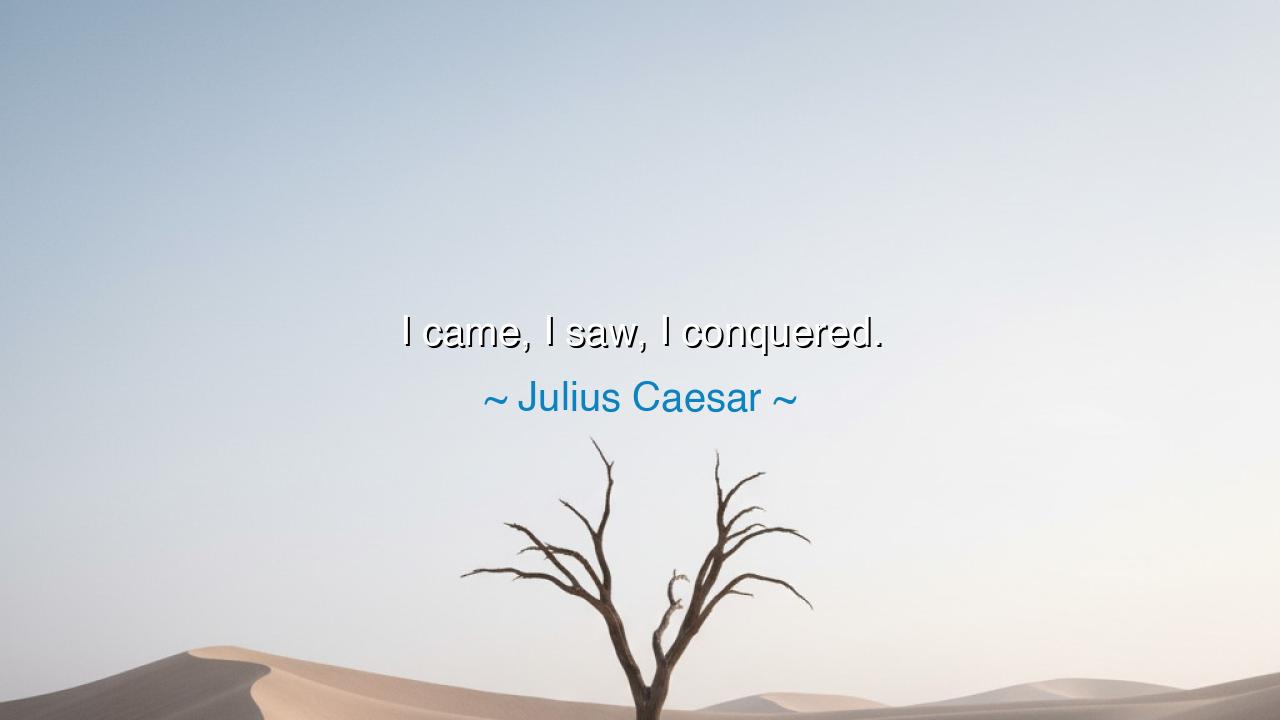
I came, I saw, I conquered.






The words “I came, I saw, I conquered”—Veni, vidi, vici—were spoken by Julius Caesar, that mighty general whose name became a symbol of dominion and destiny. These are not mere words of victory; they are the thunderous echo of a soul that dared to act with unwavering purpose. In those six syllables, Caesar captured the essence of decisive will—the power to behold the world not as it is, but as it can be shaped by human hands. To come is to enter the unknown, to see is to perceive its truth, and to conquer is to master both it and oneself.
In the year 47 B.C., Caesar uttered this phrase after his swift and total victory at the Battle of Zela, where his army crushed King Pharnaces II of Pontus in a matter of hours. There was no long campaign, no lingering struggle—only speed, clarity, and action. The message he sent to the Roman Senate was as brief as it was monumental: Veni, vidi, vici. It was both a report and a revelation. The brevity itself was a statement of power; those who act with conviction do not need many words. Caesar’s genius lay not only in his sword but in his vision—the certainty that hesitation is the enemy of greatness.
Yet, the quote is not merely about triumph on the battlefield. It speaks to the spirit of conquest within every human heart. Each person, whether soldier, scholar, or dreamer, must face their own Zela—those moments when doubt and fear rise like armies before them. The one who dares to come forth, who opens their eyes to the challenge before them, and who acts with clarity of purpose, becomes a conqueror in their own right. To see is to recognize opportunity where others see only obstacles; to conquer is to seize it before hesitation turns courage into dust.
Consider the story of Alexander the Great, who, upon reaching the shores of Asia, burned his ships so that retreat would be impossible. He, too, embodied the essence of Caesar’s cry. He came into a strange land, he saw the vast unknown before him, and he conquered not only kingdoms but also the fear that binds the spirit. His victories were not born of luck, but of resolve—an understanding that destiny favors those who commit wholly to their path. Like Caesar, he did not wait for permission from fate; he seized it with both hands.
In the same manner, each of us stands before our own battles—whether they be dreams long deferred, fears unspoken, or challenges that seem insurmountable. To live meaningfully is to adopt Caesar’s rhythm of action: arrive with courage, perceive with wisdom, and strike with conviction. For in the eyes of destiny, hesitation is defeat. The soul that acts swiftly and wisely, that moves with both vision and strength, conquers not by accident but by nature.
But there is also humility within the echo of these words. To conquer is not always to subdue others—it can mean mastering oneself: one’s impulses, doubts, and limitations. Many wars rage within the heart that no sword can end. The greatest victors are not always those who build empires, but those who build character. Caesar’s phrase reminds us that power without purpose is empty, and that true conquest begins with understanding what is worth conquering.
The lesson is clear: Life grants no reward to those who merely wait. Action, guided by clear vision and steadfast heart, transforms fate itself. So let this ancient wisdom burn within you—“I came, I saw, I conquered”—not as arrogance, but as affirmation. Come boldly into the world; see deeply into the nature of your struggles; and conquer with integrity, not pride.
Practical action: Begin each day as Caesar began his campaign—decisively. When a task appears before you, do not linger in hesitation. Step forward, understand it fully, and commit to its completion. Make these three words your rhythm of life: Come with courage. See with clarity. Conquer with will. For in doing so, you will not merely live—you will leave a mark upon the world, as timeless as Caesar’s own.






AAdministratorAdministrator
Welcome, honored guests. Please leave a comment, we will respond soon